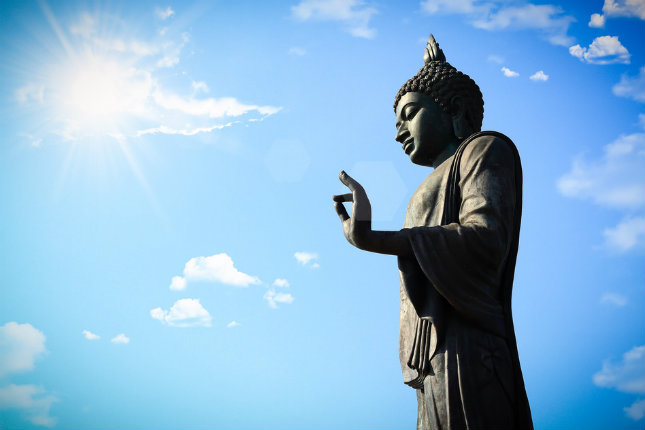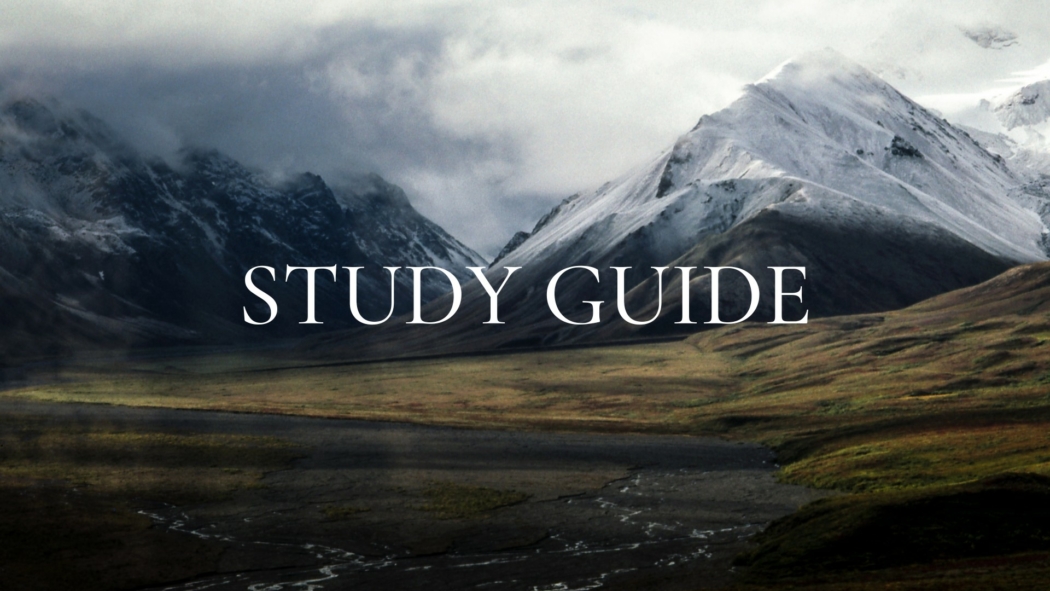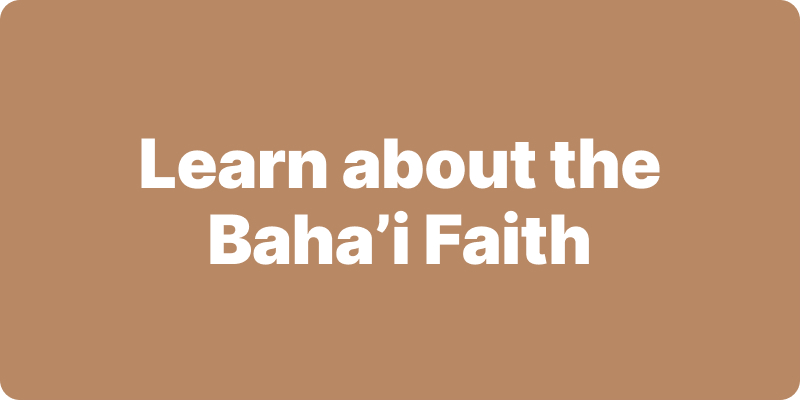Once upon a time, during my wide-eyed twenties, I did my Baha’i Year of Service in the tropical island of Sri Lanka. Not only was it the first exposure this Persian-Finnish cross-breed had to the serenity and beauty of golden beaches and swaying palm trees, but it was there when I first realized that Buddha and Baha’u’llah spoke the same language. And no, I don’t mean Pali and Persian.
It is all too easy to pinpoint the obvious differences between the modern practices of Buddhism and the Baha’i Faith. But it isn’t all that difficult to draw profound parallels either. After all, Abdu’l-Baha described the Buddha as “the cause of the illumination of the world of humanity”, and for the Baha’is, Buddha was nothing less than an earlier Messenger of God — a notion that will not be quite as easily swallowed by your average Buddhist monk.
Yet it turns out that one can even draw parallels between the lives of these two Manifestations of God. Both the Buddha and Baha’u’llah came from families of nobility, and were guaranteed positions of wealth and power in the societies in which They lived, but Both forfeited the ‘good life’ in order to be among the poor and to share with others Their higher calling.
But there’s more. No two bodies of scripture emphasize detachment from the impermanent as much as the Pali Canon (an ancient collection of suttas or ‘discourses’ attributed to the Buddha) and the Writings of Baha’u’llah.
Thus shall ye think of this fleeting world; a star at dawn, a bubble in a stream, a flash of lightning in a summer cloud, a flickering lamp, a phantom, and a dream.
– The Buddha Gautama, Diamond Sutta
Live then the days of thy life, that are less than a fleeting moment, with thy mind stainless, thy heart unsullied, thy thoughts pure, and thy nature sanctified…
– Baha’u’llah, The Hidden Words
The Four Noble truths of Buddhism are simple yet profound. In a nutshell, they state that the cessation of suffering (dukkha) is the ultimate goal of human existence, and detachment from transient things is the only way to attain it. The attainment of complete detachment from selfish attachment is called ‘nirvana’ — a term that is frequently likened to a state of bliss and happiness which the freedom from attachments gives rise to.
Luminous is this mind, brightly shining, and it is free of the attachments that visit it. This the noble follower of the way really understands.
– The Buddha, Anguttara Nikaya
The fourth noble truth is unique. For it is in fact an eight-step path of eight virtues — such as right thinking, right speech and right action — the disciplined observance of that which is instrumental to attaining nirvana. The similarities to the Message of Baha’u’llah are striking.
Blessed and happy is he that ariseth to promote the best interests of the peoples and kindreds of the earth.
– Baha’u’llah, Gleanings from the Writings of Baha’u’llah
The Baha’i Faith, of course, suggests there is no way to become detached from the impermanent unless there is something permanent and eternal to put our trust on instead. But in fact the famous Udana passage in the Pali scriptures also states the same thing. This passage is a favourite among theists who wish to demonstrate that Buddhism may also have had a monotheistic origin, as indeed Abdu’l-Baha unequivocally affirms.
There is, O monks, an Unborn, Unoriginated, Uncreated, Unformed. Were there not, O monks, this Unborn, Unoriginated, Uncreated, Unformed, there would be no escape from the world of the born, originated, created, formed. Since, O monks, there is an Unborn, Unoriginated, Uncreated, Unformed, therefore is there an escape from the born, originated, created, formed. What is dependant, that also moves; what is independent does not move.
– The Buddha, Udana 8:3
Yet the fact remains that Buddhism, in its current ‘official’ forms, is non-theistic. It regards the existence of God or gods as irrelevant to the achievement of its central goal. ‘Non-theism’ is not to be confused with ‘atheism’. According to most current forms of Buddhism, a Buddhist is free to believe in God, or to disbelieve, if one or the other helps him on his path to reduce suffering in the world. Again, this is not entirely unlike the Baha’i Writings in which it is written:
If religion becomes the cause of enmity and bloodshed, then irreligion is to be preferred.
– Abdu’l-Baha, The Promulgation of Universal Peace
Furthermore, as in the Baha’i Faith, a significant level of religious tolerance is apparent in Buddhism. Although one could perhaps qualify the Buddhist brand of religious tolerance as a kind of a “cool tolerance” as opposed to a more active and world-embracing tolerance prompted by Baha’u’llah. The latter brand involves a commandment, from God none other, to consort with all religions with friendliness, to establish their essential unity, and to regard them all as absolutely necessary historical revelations of the same world-civilizing Truth. Yet, despite its non-theism, traditional day-to-day Buddhism in the rural areas of most Buddhist-majority countries continues to be palpably theistic in character. Villagers across South-East Asia and South Asia treat Buddha, Himself, as a prayer-hearing and prayer-answering being in much the same way as the so-called Abrahamic religions regard God.
So I ended up bringing much more back home with me from Sri Lanka than vibrant-coloured batiks and a mouth numbed by the hottest curries known to man. Owing to our shared principles of tolerance and rational examination of all truth-claims, I discovered how easy it was, as a Baha’i, to find a common language of constructive dialogue with Buddhists well-versed in their own scripture. Indeed, in the present global turmoil, I cannot think of more natural partners in the promotion of interfaith harmony than Buddhists and Baha’is. Yes, what a privilege it is to have such elder brothers.
Put away all hindrances, let your mind full of love pervade one quarter of the world, and so too the second quarter, and so the third, and so the fourth. And thus the whole wide world, above, below, around and everywhere, altogether continue to pervade with love-filled thought, abounding, sublime, beyond measure, free from hatred and ill-will.
– The Buddha, adapted from the Digha Nikaya
Posted by
Sam Karvonen is a ridiculously fortunate husband and a thoroughly blessed father. He is specialized in conflict-affected countries and inspired by the everyday heroism of their lay citizens. Oh, and a Baha'i of course.









































Lovely article – many thanks. I would point out that your assertion that “one could perhaps qualify the Buddhist brand of religious tolerance as a kind of a “cool tolerance” ” might be misinterpreted to mean that Buddha, Himself, took this stance. As a Manifestation, He would undoubtedly strongly uphold the common, Divine origin of the world’s revealed religions, just as did Baha’u’llah. I assume that you are referring, in your statement, to Buddhism as generally (if this word can be applied) practiced today. 🙂
Basheer Badiei (April 4, 2013 at 4:41 PM)
You’ve put it very well, Basheer. Thank you! Indeed, Buddhism, as it is practiced today, was intended. And the fact that despite not necessarily going to as great lengths as the Bahá’ís in regarding all religions as expressions of the same Source, Buddhism (and other so-called “Dharmic” religions) treats other religions with an otherwise unmatched spirit of tolerance and respect.
Sam Karvonen (April 4, 2013 at 3:52 AM)
Having spent a decade until 2007 employed in China teaching languages and having plucked New Cathay’s most beautiful rose, the mother of our 9 y o Eddie and 3 y o Amin, I find eastern culture fascinating. Many thanks Sam for your erudition on the subject. Your words on atheism vis a vis non-theism i m o will increasingly grow in importance as society reels and relates to an ever more vocal secularly centerd world – east and west:
“Yet the fact remains that Buddhism, in its current ‘official’ forms, is non-theistic. It regards the existence of God or gods as irrelevant to the achievement of its central goal. ‘Non-theism’ is not to be confused with ‘atheism’. According to most current forms of Buddhism, a Buddhist is free to believe in God, or to disbelieve, if one or the other helps him on his path to reduce suffering in the world. Again, this is not entirely unlike the Baha’i Writings…”
While it’s true that we Baha’is must consort with the followers of all religions in a spirit of love and tolerance there’s nothing new in the fact (since the Master’s clarification which we should take on board) that its leaders over many generations have taken it off the Path, almost entirely and much of their perversity (persistent error) and poor personal example and lack of moral courage is as one big problem attributable at the root to the non theistic beliefs opined by its ‘scholars’
Scholars vary widely in opinion as to the views, merits and ranking of the stars in the firmament of the many branches of Buddhism; the status of Lord Buddha has been interpretted incorrectly in many instances, Confucius and others are misunderstood too. In our interfaith consultations we Baha’is need to understand the full truth; this is not to say that we need voice it until the seeker is ready. ‘Not everthing a man knows can be divulged’ said the Blessed Beauty
‘Abdu’l-Baha’s explanation might well set the scene for you
But your wisdom will be needed as to when to reveal your knowledge:
THE TWO CLASSES OF PROPHETS
Question.—How many kinds of Prophets are there?
Answer.—Universally, the Prophets are of two kinds. One are the independent Prophets Who are followed; the other kind are not independent and are themselves followers.
The independent Prophets are the lawgivers and the founders of a new cycle. Through Their appearance the world puts on a new garment, the foundations of religion are established, and a new book is revealed. Without an intermediary They receive bounty from the Reality of the Divinity, and Their illumination is an essential illumination. They are like the sun which is luminous in itself: the light is its essential necessity; it does not receive light from any other star. These Dawning-places of the morn of Unity are the sources of bounty and the mirrors of the Essence of Reality.
The other Prophets are followers and promoters, for they are branches and not independent; they receive the bounty of the independent Prophets, and they profit by the light of the Guidance of the universal Prophets. They are like the moon, which is not luminous and radiant in itself, but receives its light from the sun.
The Manifestations of universal Prophethood Who appeared independently are, for example, Abraham, Moses, Christ, Muḥammad, the Báb and Bahá’u’lláh. But the others who are followers and promoters are like Solomon, David, Isaiah, Jeremiah and Ezekiel. For the independent Prophets are founders; They establish a new religion and make new creatures of men; They change the general morals, promote new customs and rules, renew the cycle and the Law. Their appearance is like the season of spring, which arrays all earthly beings in a new garment, and gives them a new life.
With regard to the second sort of Prophets who are followers, these also promote the Law of God, make known the Religion of God, and proclaim His word. Of themselves they have no power and might, except what they receive from the independent Prophets.
Question.—To which category do Buddha and Confucius belong?
Answer.—Buddha also established a new religion, and Confucius renewed morals and ancient virtues, but their institutions have been entirely destroyed. The beliefs and rites of the Buddhists and Confucianists have not continued in accordance with their fundamental teachings. The founder of Buddhism was a wonderful soul. He established the Oneness of God, but later the original principles of His doctrines gradually disappeared, and ignorant customs and ceremonials arose and increased until they finally ended in the worship of statues and images.
Now, consider: Christ frequently repeated that the Ten Commandments in the Pentateuch were to be followed, and He insisted that they should be maintained. Among the Ten Commandments is one which says: “Do not worship any picture or image.” At present in some of the Christian churches many pictures and images exist. It is, therefore, clear and evident that the Religion of God does not maintain its original principles among the people, but that it has gradually changed and altered until it has been entirely destroyed and annihilated. Because of this the manifestation is renewed, and a new religion established. But if religions did not change and alter, there would be no need of renewal.
In the beginning the tree was in all its beauty, and full of blossoms and fruits, but at last it became old and entirely fruitless, and it withered and decayed. This is why the True Gardener plants again an incomparable young tree of the same kind and species, which grows and develops day by day, and spreads a wide shadow in the divine garden, and yields admirable fruit. So it is with religions; through the passing of time they change from their original foundation, the truth of the Religion of God entirely departs, and the spirit of it does not stay; heresies appear, and it becomes a body without a soul. That is why it is renewed.
The meaning is that the Buddhists and Confucianists now worship images and statues. They are entirely heedless of the Oneness of God and believe in imaginary gods like the ancient Greeks. But in the beginning it was not so; there were different principles and other ordinances.
Again, consider how much the principles of the religion of Christ have been forgotten, and how many heresies have appeared. For example, Christ forbade revenge and transgression; furthermore, He commanded benevolence and mercy in return for injury and evil. Now reflect: among the Christian nations themselves how many sanguinary wars have taken place, and how much oppression, cruelty, rapacity and bloodthirstiness have occurred! Many of these wars were carried on by command of the Popes. It is then clear and evident that in the passage of time religions become entirely changed and altered. Therefore, they are renewed.
‘Abdu’l-Bahá, Some Answered Questions pp 164-166
Encapsulating one might say:
‘their institutions have been entirely destroyed. The beliefs and rites of the Buddhists and Confucianists have not continued in accordance with their fundamental teachings’
So much for the institutions of the Buddhists, but as Sam says , many individual believers are sincere souls.
And many others have been deceived by their leaders; i.e the history of religion, to such an extent that:
‘The meaning is that the Buddhists and Confucianists now worship images and statues. They are entirely heedless of the Oneness of God and believe in imaginary gods like the ancient Greeks’
Might I also add in context ergo that many or all Christain institutions mirror those of Buddhism’s decay and that while our own blessed institutions are divinely guided and infallible the individuals at the helm are not; in fact our worst enemies (which is not at all to suggest our House members etc) are Baha’is. Enemies out side of the faith can be easily countered but our internal enemies are well hidden and are so dangerous that they can bring on crisis after crisis
Baha’i love
Paul
A similarly influential story in a similar time axis applies in the Far East concerning Confucius, Mencius, Lao Tse, Mo Zi and others. Followers of the Buddha and Confucius still debate as to whether their teachings include belief in God or in gods. What they do not contest is that Confucius constantly invoked Heaven, which at that time in China and in many lands was a destination longed for and recognized by all as God’s abode or of the gods. In other words in Old Cathay two and a half millennia ago the existence of God or of lesser deities was a given. The all time champion par excellence of Greek philosophy was Socrates for he courageously lived up to the teachings of his profound wisdom. Bahá’u’lláh’s word is the standard and He explains in The Tablet of Wisdom, available in full in the appendix.
Paul Desailly (April 4, 2013 at 12:31 AM)
Thanks Paul for your articulate and lettered views, as well as the citation from ‘Abdu’l-Bahá.
All the present-day noise about Buddhism as an “atheist religion” (or even a “non-theistic” religion) is actually a relatively late Western innovation, and traces its roots to (1) Christian condemnation of Buddhism as a godless creed as well as (2) its consequent appeal to secular humanists. It is true of course that traditional Buddhism as it is practiced in Buddhist-majority countries simply doesn’t have a notion of God. But it is equally true that Buddha himself has taken on a god-like role in the minds of average Asian Buddhists. The popularity of Buddhism among Western atheists is also a relatively recent phenomenon. In an overly materialistic and consumption-frenzied society, many an intelligent and sincere Western soul is looking for spiritual guidance and meaning to their lives without the emotional discomfort of a moral-judge God which Christianity (as it is often practiced) preaches about. A personally sanitized version of Buddha’s teachings does the trick for these atheists. And if it works, I’m all for it. But it involves a lot of cherry-picking to read the Pali Canon without any metaphysical notions (say, reincarnation or nirvana) and deities (the multifarious devas).
To be perfectly honest, I find it somewhat biased, unscholarly and anachronistic (whilst perhaps inadvertently so) when self-proclaimed atheists see in the Pali Canon some kind of overwhelming support for modern Western atheism. Non-theism, maybe, but not atheism. The basic tenets of cessation of dukkha, dependent origination and the impermanence of all things, when violently ripped from other basic tenets such as nirvana and reincarnation, and when they are embraced at a safe distance from Buddhism’s most common Asian practices and superstitious beliefs (equally supported by the Pali Canon), are obviously attractive to skeptical Western minds. But to call it “Buddhism”, even in terms of Buddhism’s ‘basic doctrines’ that unite the various denominations today, remains highly debatable.
Sam Karvonen (April 4, 2013 at 4:02 PM)
Sam opines that
‘A personally sanitized version of Buddha’s teachings does the trick for these atheists. And if it works, I’m all for it.’
I think I agree with you in that a little bit of truth, love and wisdom is better than nothing at all
Where I would ask you to reconsider though is the part about ‘it works’.
How can it work when the ‘it’ is completely devoid of the basis and fundamentals of true religion?
I’m referring to the FULL explanation vis-a-vis ‘the Oneness of God’ which entails more than the Baha’i teaching surrounding
Progressive Revelation.
The Master is blunt and His use of the superlative suggests to me that these atheists and non theists, as distinct from traditional Buddhists, who cherry pick this or that form of Buddhism as it suits their passions and desires etc are not to be trusted: ‘The meaning is that the Buddhists and Confucianists now worship images and statues. They are entirely heedless of the Oneness of God’
‘The beliefs and rites of the Buddhists and Confucianists have not continued in accordance with their fundamental teachings’
That sort of atheistic Buddhist, often western, is a dangerous person who often receives inordinate attention and much publicity and whose prolixity is often incorrectly construed as wisdom by the rank and file believer. The danger is especially dangerous for those who follow like sheep and fail to realize that what Bah’is mean by religion is ascertained by investigation and not based on mere imitation
As an aside, it amuses and on occasion bemuses me that God has endowed so many high priests of atheism with oratorical and articulation skills
‘Who will riddle me the how and the why?’
That Buddhism is riddled with atheists is cause for deep concern.
Nothing on God’s earth save utter rejection of such a position will make atheists act honestly towards their neighbours.
The Baha’i teachings make it childs’ play to refute atheists (if only we’d receive the media’s full attention for a while – magari!) but what I’d like to see Baha’i scholarship countering in concise arguments the average person can digest is the believe in gods, plural.
Logical proofs negating atheism from the Master’s pen abound, e.g. to Nobel Laureate, Henri Bergson, and to the even more famous doctor-professor Auguste Forel but where my pen is weak is in countering with proofs the belief in gods, especially when voiced by well educated western polytheists rather than as occurs with various indigenous beliefs, animists, tribalists, traditionalists etc yet to receive the bounties of a universal education system
Baha’i love
Paul
Paul Desailly (April 4, 2013 at 11:41 PM)
Hi everybody and thank you for the article and the comments! Appreciate every part of it. I just wanted you to know that a lot is going on in Malmö when it comes to gatherings of all religions. The most interesting is the one called “Social Cohesion” on the recommendation of the bishop of Lund. The idea is to investigate and then apply the result of the investigation summarized in this question: “What can all the religions in Malmö TOGETHER DO for the city of Malmö?”. It has up until now been an interview with 100 different persons belonging to different religions, authorities in town and dignitaries from different fields of social life in town. The mayor of town, police officers, Region Skåne, different churches, the bishop, filmmakers besides different religious representatives have been present at different meetings arranged by “Social Cohesion”. Three round tables has also been arranged at the library in town. Up until now has this project paved the way for 1 published interview and 2 (instead of 1) roundtable discussions for Bahaies. In three different large meetings have they also been the means for raising the name of Bahaullah amongst hundreds of people.
We have also the group called Co-exist for religious groups in Malmö. During the Eurovision Song Contest it is going to be a Co-exist tent. We are as a suggestion from the Bahais going to have “Fortune cookies” with quotations from different holy scriptures inside as an easy means to communicate with people visiting the tent.
And then the group called “Faith and Tolerance” meeting once a month, having prayers from all holy scriptures or different interesting themes. The theme next time is going to be about “Ego”, even this a suggestion from Bahais.
There is at least 2-3 more groups, not necessary to go into it. The very first initiative was taken by the assembly of Malmö when the war started between Iran/Irak. All religions gathered together praying for the war. Then Anna Karin Hammar, a priest in Lund continued the work.
Now the tv wants Bahais to be in a project for local tv by telling something about the faith between 1-3 minutes. They have already taken the videoclips and we are waiting for the result. I hope you become as happy by these news as we should be in Malmö.
A simple philosophy led to all this: “Let us take a chair!” (where something is going on! The rest is Bahaullah´s).
I would love to hear about teaching activities you are up to. There is always things that can inspire!
Much love to all!
Simin Ekman (April 4, 2013 at 8:32 PM)
Ruhih Khanum’s ‘The Priceless Pearl’, if I recall correctly, states that at the time of the Guardian’s passing in a hotel near London in 1957 his favourite book of English literature and history was at his bed side.
Testing my feeble memory further I seem to recall some where in ‘The History of the Decline and Fall of the Roman Empire’ that Edward Gibbon in the intro or in the early chapters forcibly decries the worship of gods as the paramount evil
If any reader of this Blog could cite exactly Mr Gibbon’s wording I’d be most appreciative as I feel that its inclusion into my recent, as yet unpublished essay, “Atheism is Untenable” will enhance my lengthy denunciation of atheism, a hypocritical position (at least at some point in every atheist’s life), I as a former atheist consider most dangerous and increasingly pervasive in today’s capitalist society. We have i m o moved from a capitalist economy into a capitalist society in which almost every thing has a monetary value. The superficial observer and the cowardly academic will seriously underestimate and dismiss our present plight and its root cause. ‘So many good people lack good judgment and so many clever people lack good character.’
Baha’i love
Paul
PS
A very fresh reproach put out by an official advisory body to the US government is of special interest I feel to American Baha’is:
TEXT SIZE – + By Richard Solash
April 30, 2013
WASHINGTON — A U.S. government advisory body says that Iran, Iraq, Pakistan, Uzbekistan, Tajikistan, and Turkmenistan are among the world’s worst violators of religious freedom.
The U.S. Commission on International Religious Freedom’s 2013 report says the countries should be designated “countries of particular concern” by the U.S. government for “particularly severe” violations — a designation that allows for arms embargoes and other restrictions.
The countries’ violations are said to include carrying out or tolerating “acts such as torture, prolonged detention, or disappearances, or other flagrant denials of the right to life, liberty, or the security of persons.”
Iran and Uzbekistan, along with China, North Korea, and several other countries, have already been designated by the White House, although restrictions on Uzbekistan have been waived.
Restrictions based on the designations also expire in August if the Obama administration does not renew them.
The report also listed Afghanistan, Azerbaijan, Kazakhstan, and Russia among second-tier violators, where “at least one, but not all three, of the elements of the ‘systematic, ongoing, egregious’ standard” for violations is met.
The second-tier designations are meant to “provide advance warning of negative trends.”
The commission, a bipartisan body, said it based its recommendations on “the standards found in the Universal Declaration of Human Rights and other international documents.” The commission said it also worked with human rights groups, victims of religious persecution, policy experts, and U.S. officials and made country-visits in formulating its findings.
This year’s report covers from January 31, 2012 to January 31, 2013.
According to the commission, that period saw continuing deterioration of religious freedoms in Iran — a trend it say is “likely to worsen” as the June presidential election approaches.
Alleged violations include continued imprisonment Baha’is, abuses against Christians and Sufi Muslims, and state-sponsored anti-Semitism.
The commission called on the U.S. administration to “continue to identify Iranian government agencies and officials — including Supreme Leader Ayatollah Khamenei and President [Mahmud] Ahmadinejad — responsible for severe violations of religious freedom” and sanction them.
In Iraq, the report said religiously motivated violence by extremist groups “continues with impunity.” It also said the government in Baghdad last year “took actions that increased, rather than reduced, Sunni-Shi’a and Arab-Kurdish tensions.”
The report blasted Pakistan for “fail[ing] to protect members of religious minority communities, as well as the majority faith.” It described sectarian violence as “chronic.” It also said Islamabad’s anti-blasphemy laws and related legislation “foster an atmosphere of violent extremism and vigilantism.”
The three Central Asian countries listed among the report’s worst of the worst were all cited for severe repression of nearly all religious activity beyond what is sanctioned by the state.
Prison terms for attending unapproved religious gatherings in Tajikistan, raids on religious communities in Turkmenistan, and state censorship of all religious materials in Uzbekistan were among the restrictions cited.
The report recommended making U.S. aid to Tajikistan contingent upon improvements, boosting U.S. broadcasting to Turkmenistan, and removing a waiver on penalties against Uzbekistan.
The U.S. waiver on penalties against Tashkent on religious freedom grounds has been in place since 2009.
This year’s report said, “There is concern that U.S. policy on Uzbekistan prioritizes that nation’s strategic importance as a key part of the Northern Distribution Network.”
Among second-tier countries, the report decried the Afghan constitution’s “explicit fail[ure] to protect the individual right to freedom of religion or belief.”
It highlighted the detention and imprisonment of “nonviolent religious activists” in Azerbaijan.
The commission said a religious registration law in Kazakhstan had led to “a sharp drop in the number of registered religious groups, both Muslim and Protestant.”
In Russia, the report said that “various laws and practices increasingly grant preferential status to the Moscow Patriarchate of the Russian Orthodox Church.” It also cited rampant abuses in Chechnya.
Paul Desailly (May 5, 2013 at 12:30 AM)
This article is at error. The description of Nirvana is fine but Nirvana (the Uncreated) is not ‘monotheistic’. When the mind no longer has ‘self attachment’, the peace that remains & is experienced (Nirvana) is not a god & is not theistic. The reality of a ‘vacuum’ can be used as an example. A ‘vacuum’ is not a god or a theism. ‘God’ is an idea or a thought construct. Nirvana, the Uncreated, is not ‘God’.
Dee (January 1, 2015 at 2:33 AM)
The reference in the Udana to the ‘uncreated and unborn’ is open to interpretation. And as we are told as Baha’is that all the Manifestations came from God, it is safe to use such a passage as reference to God simply because it is open to interpretation and Buddhists do not have the correct teachings of the Buddha amongst them.
We have infallible interpreters, Buddhists do not and so they interpret these things not in a way that is in conformity with truth but according to their own ideas.
This passage to me, using the Baha’i understandings, can very easily be referring to God as God is unborn and uncreated whereas nirvana is created.
This passage is referring to ‘something’ that is unborn and uncreated so it could not be speaking about a state as a state is created and not unborn.
David (November 11, 2016 at 1:27 AM)
I’ve been trying to learn more about this religion, and I’m confused. How do the Baha’i believe Buddha was a manifestation of God if he didn’t believe and teach about God?
Adam Eldridge (November 11, 2016 at 6:36 PM)
Hi Adam,
This is a really great question and something that I’ve been thinking and wondering about. These are a couple of my basic thoughts but perhaps Sam or another reader might offer something more insightful:
Abdu’l-Baha, the son of Baha’u’lla, the Founder of the Baha’i Faith, explains how God is unknowable and beyond human comprehension. He said: “… in this connection, every statement and explanation is deficient, every description and characterization is unworthy, every conception is unfounded, and every attempt to contemplate its depths is futile. Yet for that Essence of essences, that Truth of truths, that Mystery of mysteries, there are splendours, effulgences, manifestations, and appearances in the world of existence.” He then clarifies that Manifestations of God are like a mirror and reflect the unknowable. He said, “The Daysprings of those effulgences, the Dawning-places of those revelations, and the Sources of those manifestations are those Exponents of holiness, those universal Realities and divine Beings Who are the true mirrors of the sanctified Essence of the Divinity […] even as the light of the sun is fully reflected with all its perfections and bounties in a clear and spotless mirror. And if it be said that the mirrors are the manifestations of the sun and the dawning-places of the daystar of the world, this is not meant to imply that the sun has descended from the heights of its sanctity or has become embodied in the mirror, or that that limitless Reality has been confined to this visible plane.”
The language and concepts used by these Manifestations to describe the Unknowable vary differently from religion to religion. In this way, a Manifestation may not have spoke of God in the same terms as another, or at all, but the fundamental spiritual truths are the same.
Steven Phelps spoke about this briefly in the podcast with Rainn Wilson. If haven’t already listened to it, I highly it:
http://bahaiblog.net/2016/08/bahai-blogcast-rainn-wilson-episode-7-steven-phelps/
I hope this offers you some food for thought, Adam. Thank you again for posting your question!
Sonjel Vreeland (November 11, 2016 at 11:12 PM)
Hello,i find.this understandimg of the Dharma to be superficial and missing the point. The dharma cannot be understood by quotes
It must be undetstood by practice. Bahai is based upon belief.the Dharma is not. It is not a religion but the very essence of life itself. I understand the bahai position but a study of a different teaching (outside of bahai) must come from a place free from prejudise and presumption.
I would be suspicious of any assesment of Bahai by a buddhist and am suspicious of your assessment by one who has not gone deeper into dharma practice
May all beimgs be happy!
Dennis (November 11, 2017 at 5:53 PM)
Curiosity brought me here, wrong information drew me to comment.
This article is riddled with ambiguity and what Dhamma (Pali)/Dharma(Sanskrit) practitioners would consider as, “wrong view”.
If anyone reading this hopes to gain a thorough and adequate understanding of what the Buddha taught, the Dhamma/Dharma, then I would respectfully say to not take this article with any serious authority.
By all means, they may be experts in their own faith, but there are just too many claims to correct so I will just make only a few suggestions.
Put simply, the Buddha very accurately states in his doctrine the following (Pali/English):
ANICCA – change
ANATTA – dependent/no inherent self
DUKKHA – trouble/unsatisfactory
These ‘theories’ are buttressed by ‘Saddha (pali)/ faith’ (not to be mistaken with the blind faith of that of other religions) are only to be attested and agreed upon by an individual when they themselves come to clearly know and comprehend them through personal experiential knowledge, usually referred to as ñānas (insight knowledge’s). These knowledges are again, very clearly defined in the Pali canon if you wish to study them in more detail.
Further, these knowledge’s are attained by patient, practice, and persistent meditation practice called Satipatthana Vipassana, again, very clearly described in the Mahasatipatthana Sutta if you wish to know more. In this practice, you come to experience for yourself the three key themes I mentioned earlier, specifically, the empty nature and causation/arising and passing of ALL phenomena. I will not get into more detail as there is quite literally thousands upon thousands of text on this – all by way of saying, the ‘Nibbana / Nirvana / Awakening / Enlightenment of the Buddha, his ultimate realisation the path and method leading to the cessation of all Dukkha (pain, lamentation, suffering, unsatisfactoriness), was the destruction and dissolution of all ‘cankers’, mental afflictions, fetters and so on, that there is no ‘self’, hence ‘no god’, ‘no origin’. So to claim that Buddha was a ‘messenger of God’ simply flies in the face of all central Buddhist doctrine. Not to mention, the Buddha we usually speak of as Siddartha Gautama (his birth name) was not the first Buddha, he was one of a long line of Buddha emanations with one more said to pronounce himself when the Dhamma/Dharma is no longer present in the world.
You cannot state that the Buddha was unable to know God because God is incomprehensible, the Buddha asserts that there is no God, he also clearly asserts there is no ultimate spirit that lives on. So your article is fundamentally flawed in that regard.
The Buddha was said to be omniscient, all-seeing, all-knowing, whilst openly expressing that he himself was a human, not a God. It was also said in the Pali canon that Buddha was asked to teach in the heavenly realms, he was the teacher to Brahmins and Devas, if this interests you, you can again find this with a quick google search. So your comparisons of Bah’ai, God, and the Buddha look very weak and just don’t hold water I’m afraid.
It would be wise to have studied the Dhamma/Dharma in more detail before publicizing the ‘wrong view’. I surely wouldn’t make comment or comparison of a faith I do not practice. The reason I state this, again with respect, is that you are claiming that people in Asia ‘pray’ to Buddha as do believer’s of the Abrahamic faiths – this is a perversion and a misguided assertion. It is a fact that the first statue of the Buddha only came into existence nearly 600 years after his death in Bactria, an ancient Hellenic city, now modern-day Afghanistan. In any case, Buddhists do not pray to the Buddha, that is your projection of seeing someone knelt down with his/her hands placed in a prayer position in the church. When a Buddhist is in this position they are paying homage to the Buddha, as in devotion, a ‘thanks’ for expounding the Dhamma teachings. They are definitely not praying for long life, more money, happiness, etc, the Buddha clearly stated that we responsible for all these things. The Buddha never claimed that praying to him would assist someone from existing samsara, so again, this is a false claim I’m afraid, something that is perpetuating your own confirmation bias from what I gather.
As Dennis commented in November 2017 “I would be suspicious of any assessment of Bahai by a Buddhist and am suspicious of your assessment by one who has not gone deeper into dharma practice”.
This article seems to take aim at the Buddha in hope of claiming his attainments as your own, which are to anyone that has practiced and read Buddha’s teachings in detail, unique and unlike any monotheistic, polytheistic, nihilistic, etc religion or philosophy. The Buddha’s teaching is in and of itself a package deal. It is said you cannot add or subtract anything from the Dhamma/Dharma, it is full and comprehensive. To give the reader an idea, the Pali Canon alone, is 80,000 pages long. It cannot be surmised or discussed accurately in one blog post, nor compared to any other faith, respectfully.
In light of all of this information, I would hope you reconsider your blog post as it is very much misguided, even though you may have had good intentions. You are spreading mistruths and I dare say that lying is not accepted in the Baha’is faith as much as it is in the Buddhist teachings. You may want to consult further with you local Buddhist Sangha at a temple or centre, and raise these topics so you yourself can be better equipped and have ‘right view’.
May you be well and happy!
May all beings be well and happy!
Mr Curious
Mr Curious (June 6, 2021 at 8:56 AM)
I just got through reading an article “What Happens To The Brain During Consciousness-Ending Meditation”. I’ve always been, not anti-religion, but thought I was Atheist with an extreme curiosity and closet love for Buddhism. Yet, I never have referred to Buddhism as a religion, but in my mind, as more of a philosophy. I’m not book smart. I don’t claim to be. I only know what I’ve read and continue to read as I get older. I’m 44 now and I literally just removed all my Atheist stickers I had on anything of mine. The article I just got through reading, and this article just minutes after finishing the first, helped me come to a discernable understanding of my core beliefs. I’ve always felt others should be free to have their own choice of whether or not God was real or not. Their own freedoms to choose whatever religion they seem fit for them because, at the end of the day, all that should matter is…if it makes getting through this life easier for you and gives you a sense of peace with yourself and the world around you, then you do you. Wars have been fought over religions instead of all people believing that you should be able to believe in whatever you want if it makes you happy and isn’t hurting anyone. Clearly organized religion has done more then just hurt people so I wish it were true that people could have always chosen their own beliefs free of degradation or ridicule. Anyway, back on topic. I had a near death experience at the age of 8 and the only way I’ve been able to describe it is floating in nothing yet it was still something (like standing freely in space and it’s dark matter). I was completely void of all human emotion, material attachments, and the restrictions of our skin suits. I felt (which will still be described as a human emotion because I know no other way to describe it) I felt content, released, complacent, numb, comfortable. As though,this is where I (whatever I am) is meant to be. Before me was this vast body of unbelievably vivid and bright light rays, shooting in and out and around one another as one big cohesive mass. I knew that was where I was headed…and then I woke up from surgery. I was screaming and crying this gutteral visceral gut wretching cry. The nurse told me to stop or I wouldn’t be able to see my Mother. I tried. I took a deep breath and tried to hold it in but the scream just erupted out of me with only more momentum than the first time. Eventually I regained control of my sobbing. That vision me ef let me and everytime I read about Buddhism or Monks, or Meditation, I’m taken a back by the striking similarities between my experience and what I’ve read takes place during the final stages of Meditation or consciousness. Enlightenment, if you will. I feel as if Buddhism, with all of it’s philosophies, belief systems, and values, hits a cord with me. More so now than ever. Everything I’ve read about Buddhism seems uncannily on par with every thought I’ve ever had as to what life is all about and what should matter and what has validity and what holds no water, and it has found it’s way into every fiber of my being. I believe everyone on this planet, in the blink of an eye (just like the length of our existence) could learn so much about their own existence and what’s really important in our short lives, if they all took a tiny bit of time to sit down and study Buddhism, even just a little, they could have a profoundly better idea of what’s to come after our mortal selves are gone and we reach the furthest levels of our own consciousness. Separated from the ball and chain we call human emotions. Lifting the barriers to our own levels of understanding of everything around us. I truly believe people would no longer fear the most, the one thing that is inevitable in all our lifetimes…death and it would answer that burning question on everyone’s minds… what happens after we die?
Lisa Thomas (September 9, 2023 at 12:04 PM)